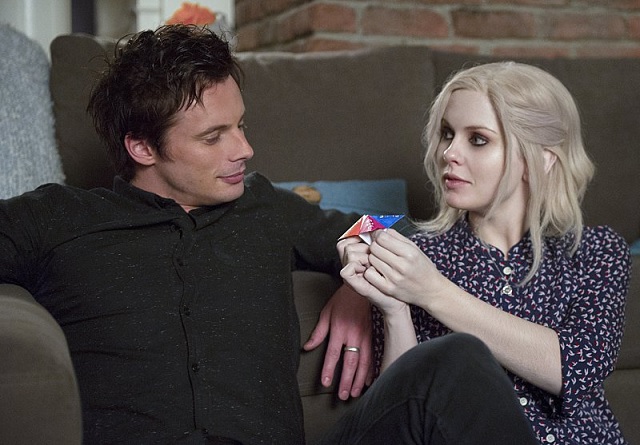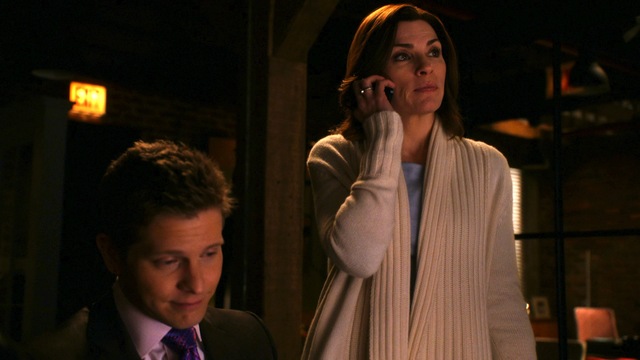Mad Men, Season 7: Episode 12 – “Lost Horizon”
Written by Semi Chellas and Matthew Weiner
Directed by Phil Abraham
Airs Sunday nights at 10 on AMC
Following last week’s “Time & Life,” which featured what will certainly be the final classic Mad Men shakeup of business, Matthew Weiner’s characters find themselves adapting (or failing to adapt) to their new lives at McCann Erickson. Don, Peggy, Roger and Joan have all been points of both contrast and comparison to one another in the span of the series’ run, but “Lost Horizon” highlights the core of their individual developments. What, after all this time, have these people learned? How have their values changed, if at all? Was the success illusory or real and tangible? And how is that success defined–simply with a dollar amount?
What is likely Joan’s thematic conclusion here is as unfortunate as was being foreshadowed in these final episodes. Despite the huge efforts made to challenge gender relations, Mad Men has to explore the insurmountable sexism of its time period, using Joan as a difficult-to-watch conduit for some of the uglier realities of the series. While Don is being treated like royalty and every other partner seems to be working on a higher floor, Joan is treated in tokenistic fashion and is constantly reminded that she doesn’t matter here, regardless of her previous status at SC&P: “I’m sorry. Who told you you got to get pissed off?” The result is another disgusting, manipulative caricature of the male executive who corners Joan into a position where she has to either fight or flee. The initial decision to take the company to court if they aren’t willing to give her her due falls in line with the person Joan has been portrayed to be since the beginning of Mad Men. But the ultimate suffocation of circumstance shows that the context simply can’t allow for someone like Joan to maintain that complete integrity and succeed, which is perhaps the most unsettling thing to think about regarding this story since Lane’s death. When Roger persuades her to take the fifty cents to the dollar deal, it’s not in a way that makes Roger look bad for ceding to his new, soulless bosses. It’s Roger, having been in the business for so long and seeing the incremental changes, knowing that it really is the best deal she’s going to get. So, while some viewers might see the move–for both characters–to be a submission of will that goes against the character, Joan is simply at the mercy of her own reality.
Roger’s own transition into the final stages of his career is much more palatable, especially since the episode contrives a way to have him interact with Peggy, which has happened too infrequently in Mad Men. Each character receives moments leading up to their time together in the ghost town of SC&P; Peggy’s, in particular, are laden with the heavy suggestion that she’s not meant to continue on to McCann Erickson, since she can’t seem to nab an office or have her supplies shipped there successfully. When they get together, though, their roles in the episode are strongest. Roger, always looking for some kind of audience and reason to drink (“Would you drink vermouth?” “Yes, I’m afraid I would.”), is the central character of Mad Men who is most detached from his feelings by virtue of humor as a defense mechanism. When he’s portrayed as emotional, it’s usually with anger; and even then, the anger is so matter-of-fact that it’s hard to see him as anyone other than the collected guy he appears to be. But when he’s speaking honestly about the hard truths he’s learned in his time in advertising, the wryness sounds much more sad coming from his mouth. Peggy picks up on this and can certainly relate, even in the relatively little time she’s been in the game. Don is, of course, Peggy’s mentor. But since Roger is Don’s mentor, there’s still a familial aspect to the Roger-Peggy relationship that comes out in the episode. In the same way that Pete gave Peggy a heads-up about the dissolution, Roger sees a way to tell a younger version of himself to do something different. Even if Peggy is stuck at McCann Erickson because of the need to keep a foot in that door, she ought to do it on her own terms, which is what she winds up doing.
Don, however, remains the focal point and is used most thoroughly to look at how a shift out of the comfort of familiarity is just too much for these characters. Don’s journey begins when he sits down at a creative heads meeting that is leagues different from what he’s been used to working at a much smaller firm. Out the window, a plane flies by behind a skyscraper, and Don knows this isn’t for him. He looks and can act the part. He introduces himself as Don Draper, from McCann Erickson. He smiles. He shakes hands. He does everything Don Draper is supposed to do. But Don’s time is over. Haunted by the ghost of Bert Cooper (in a pleasantly entertaining way), he tries to latch onto something–in this case, Diane. “You like to play the stranger,” Bert tells him. Don doesn’t really get to play anything, though, since Diane’s ex-husband sees right through him, genuinely communicating to him (in-between short bursts of annoyance and anger) that he can’t save Diane. Don can’t save anyone, really, including a Betty who has no need for him and a Sally who has become independent and purposefully distanced from her parents. It’s good in the sense that Don is free to become something and someone else, but it’s also terrifying in the same way that graduating from boyhood to adulthood is. That’s kind of where Don is at this point, removed from the immaturity (and words much, much more severe) of his “youth” as an ad man and left driving around–lost in space, like Major Tom.
– Sean Colletti
The Drawing Board:
– Don is compared to the white whale, a not-so-subtle phallic symbol that no longer fits the kind of person Don is trying to become. Just like he’s no longer the creative guy his bosses want him to be.
– If Ed making long-distance phone calls to acquaintances in Japan is the way he goes out, that’s one hell of an exit.
– Betty is reading Freud, finding her own entry into psychotherapy long after Don pushed her into being analyzed by someone else.
– “Even if your name is on the damn door, you should know better than to get attached to some walls.”






